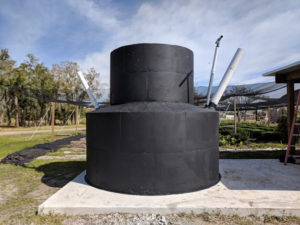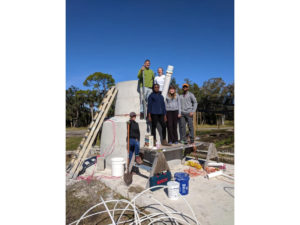
February 23, 2019
Fat Beet Farm is a food service commissary that grows microgreens hydroponically and uses raised beds. They serve the five Curci Family Noble Crust restaurants in Tampa.
Located in Oldsmar near the bridge to Dunedin and the Race Track, not far from the University of South Florida, Fat Beet Farm serves as a sustainable practice model for the Food Energy Water Nexus Zero Waste Initiative where Patel College Interns work for credit to put sustainable development theory into practice.

The Solar CITIES 10m3 biodigester at the site, built with student and volunteer labor by Dr. Thomas H. Culhane and the Curci family for well under $10K, demonstrates the least cost yet greatest efficiency solution for treating food production organic residuals and restaurant wastes on site. A direct result of the biodigester is the elimination of garbage pickup costs and grease trap clean out fees while offsetting significant amounts of fossil fuel energy from the food production and preparation processes.
The above ground 9’x9′ digester is heated by a 60 vacuum tube solar hot water split system for year round operation. It produces both fuel and fertilizer from food waste for growing and preparing healthy food without the need for chemical soil amendments or hydroponics solutions and without the need for cooking gas or electricity derived from petroleum.
The food grinder, pumps, and lighting for the site are provided by solar electric power making the Fat Beet Farm site an inflation-resistant and service disruption resilient off-grid alternative that radically reduces costs and improves living and working conditions for small family businesses that we hope to replicate throughout South Florida.


